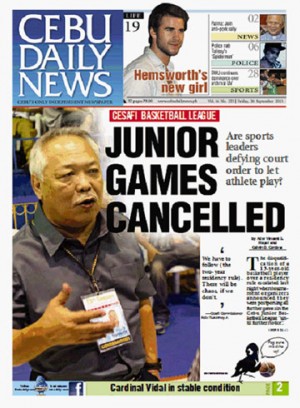
The decision will affect four private schools lined up for the semi-finals of the Cebu Schools Athletic Foundation Inc. (Cesafi), including Scott Aying’s USC Baby Warriors.
No specific reason was given but the move was seen as a way of avoiding further legal trouble, including being cited for contempt of court.
Cesafi officials were served a court order Wednesday night at the Cebu Coliseum “to allow Scott Aying to play beginning today in the games of the 13th Cesafi Season” after the student’s parents filed a petition with the Regional Trial Court and secured a Temporary Restraining Order.
Cesafi organizers chose to call off the semi-finals scheduled that evening.
The games were to resume last night. Instead the Cesafi board of trustees, in an urgent meeting at a Cebu city restaurant agreed “to postpone the Cesafi high school games starting tomorrow Friday, Sept. 20, 2013 until further notice,” according to a text message from Commissioner Felix O. Tiukinhoy Jr.
Sports organizers risk being cited in contempt of court for defying the order, said Donato Gonzalez, lawyer of the Aying family, but he said he hopes they will be reasonable and will comply with the order.
A hearing on the petition for injunction is set on Sept. 26.
Named respondents are Fr. Manny Uy, SJ of Sacred Heart School-Ateneo de Cebu as Cesafi president, Tiukinhoy as Cesafi commissioner, Jess Himotas and Danny Duran as members of the Cesafi screening committee, and the foundation itself.
Schools vying in the semi-finals are Sacred Heart School-Ateneo de Cebu, Cebu Eastern College, University of the Visayas, and University of San Carlos-Basic Education Department.
Parents of Aying filed a petition for injunction last week calling the sudden disqualification of Scott as unfair, baseless and an act of “child abuse”.
Cesafi invoked a two-year residency rule for competing athletes.
Scott, who stands 6-foot-1, was one of the best players of Don Bosco Tecnological Center, before he transferred to San Beda College in 2012 looking for “bigger opportunties” and further training with Coach Carlo Britt Reroma.
When the coach returned to Cebu and joined USC, the boy followed suit and was accepted in USC’s Baby Warriors.
TYPO ERROR
RTC Judge Simeon Dumdum Jr. yesterday amended his order to correct the date of issuance to Sept. 18 instead of Sept. 16.
“There was just a typographical error in the day the TRO was issued,” Judge Dumdum said.
The date of the document was earlier questioned by Cesafi commissioner Baldomero Estenzo who found it “on its face, … irregular” because he was aware that Judge Dumdum, the second judge handling the case, was not yet handling the petition on Sept. 16.
Dumdum told Cebu Daily News that “He (Aying) is allowed to play. That is very clear in the Temporary Restraining Order (TRO) that I issued.”
The court order directed Cesafi officials to show cause why the temporary restraining order should not be made a permanent injunction.
“I am hopeful that the gentlemen of Cesafi will finally honor the amended TRO with the corrected date by allowing Scott to play in tomorow’s scheduled game for USC now that they have nothing to complain about,” Gonzales told CDN.
“It’s not even sure that USC will win the games. We just want that the child be allowed to play. Thats the only morally sound thing to do. He is a minor,” he added.
Gonzales said Aying should have been allowed to play in last Wednesday’s game against the Cebu Eastern College Dragons, when the TRO was served by a court sheriff.
“Cesafi could have been humble enough by respecting the legal order of the court. All law practioners ought to know what is a TRO and a status quo order. They should have not cancelled the game and allowed minor Aying to play. It was an opportunity for them to redeem themselves and be respected again but they wasted it,” Gonzales said.
He and lawyer Barbie Samson represent the Aying family in the legal battle.
Gonzales said it’s up to his clients whether to ask the court to cite Cesafi respondents in contempt for defying the judge’s ruling.
“I have to ask my client about that but I don’t think we will reach that stage. They are learned gentlemen and I don’t think they will again defy the order of the court,” he said.
Spouses Danilo and Avah Aying went to court last Sept. 13 saying their child was “unjustly” deprived by Cesafi’s two-year residency rule from playing in this year’’basketball games.
Under Cesafi rules, “any high school student athlete of a Cesafi member school who transfers to another member school shall be required a minimum of two-year residence to qualify to play. The period of residency shall be counter as part of his/her playing years.”
The Ayings said the rule, which was intended to discourage piracy among school teams, was misapplied in Scott’s case since he transferred to San Beda College in Manila, which is not a Cesafi-school before he returned to Cebu and joined the USC Baby Warriors, a Cesafi member.
All 15 players of USC were given the go signal to play for the school in the 13th Cesafi Season. However, last August 2 or the day before the tournament’s opening, USC received a letter from the Cesafi Screening Committee, stating that the petitioner’s son is disqualified to play.